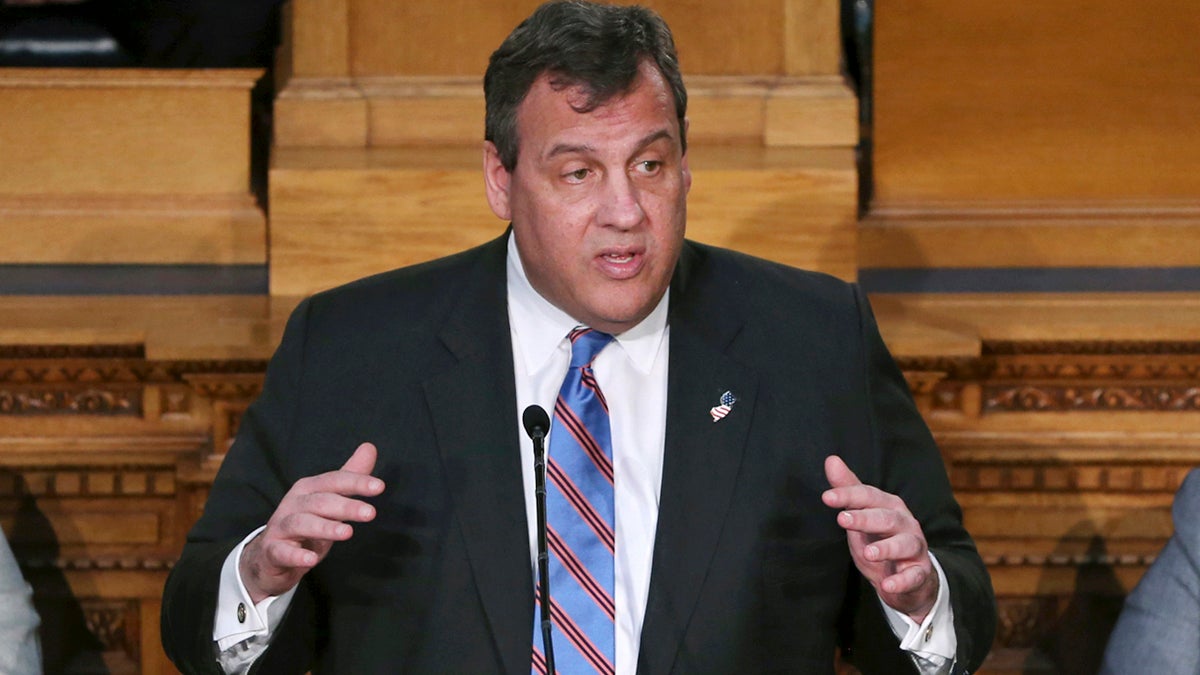Governor Christie’s final budget calls for using Lottery funds for pensions

New Jersey Gov. Chris Christie stands in the Statehouse as he delivers his budget address Tuesday, Feb. 28, 2017, in Trenton, N.J. Christie unveiled his final budget proposal as governor. (AP Photo/Mel Evans)
New Jersey Gov. Chris Christie put forward a plain-vanilla, $35.5 billion state budget yesterday that calls for no new tax increases or tax cuts, and only flat funding in a number of key areas, including for schools, property tax relief programs, municipalities and colleges and universities.
But Christie, in the final budget address of his two-term tenure, also shook up the State House by floating a series of new proposals along with the new spending plan, including one that would see lottery revenues redirected to the grossly underfunded public-employee pension system. He also called on Horizon Blue Cross Blue Shield, the state’s largest health insurance company, to voluntarily contribute to his efforts to fund addiction services.
Whether lawmakers will take those proposals and a similarly ambitious call to overhaul the state’s school-aid formula in 100 days seriously as they dig deeper into the budget over the next several months remains to be seen. After the Republican governor’s speech before a joint session of the Legislature Tuesday afternoon, Democratic legislative leaders promised only to look more closely at his ideas. Meanwhile, Republicans and business leaders praised Christie as a steady leader on fiscal issues.
One last drag-out fight or legacy repaired?
Christie’s budget presentation kicks off a formal process that will play out over the next several months in advance of a June 30 deadline, and it should provide a window into how the governor plans to finish out his lame-duck year, including whether he intends to wage one last drag-out fight with Democratic legislative leaders like last year’s showdown over transportation funding or instead will look to repair a legacy saddled with historically low approval ratings by finding compromise on an issue like school funding.
Christie left the door open to both options Tuesday, offering what he said was a “heartfelt” invitation to work with lawmakers on crafting a new school-aid formula, but also promising to “act alone” if forced to.
“We still have work to do,” Christie said. “We will always have work to do.”
In all, Christie’s new budget for the fiscal year that begins July 1 calls for a modest increase in spending of about $1 billion, which is less than 3 percent higher than the $34.5 billion budget that he signed into law last year. Much of the increase will go toward the pension system, with the state contribution rising by about $650 million, up to $2.5 billion.
And Christie said he also intends to abide by a new law that calls for the pension contribution to be made in quarterly installments instead of all at once at the end of the fiscal year.
Money for pensions, healthcare and little else
During a briefing with reporters held earlier in the day, New Jersey State Treasurer Ford Scudder suggested meeting the pension obligation and covering employee healthcare costs means the state has only limited resources for other purposes, like aid to schools and municipalities. Christie underscored the same point during the budget address by saying that in the face of rising employee-benefit costs new reforms are needed, or the state “simply cannot meet its obligations.”
The budget itself provides only flat funding for formula-based aid sent to local school districts and flat funding for municipal aid programs. Christie is also budgeting a slight reduction in spending on property tax relief like the Homestead and Senior Freeze programs that benefit seniors, the disabled and low- and middle-income homeowners. That comes after the average property tax bill rose by nearly $200 in 2016, up to a record high of $8,549.
Christie is also continuing a practice of maintaining only slim budget reserves to hedge against unforeseen spending needs or drop-offs in revenue, planning for a less than $500 million surplus during the 2018 fiscal year. His spending plan also already counts on $125 million in employee healthcare savings that cannot be implemented unilaterally, putting immediate pressure on the surplus.
And even with the increase in funding for the pension system — the $2.5 billion contribution would be a record for the state in one fiscal year — the overall contribution will fall far short of the roughly $5 billion that actuaries say is needed to restore the pension system to good health. New figures released by the state earlier this week indicated the pension system’s unfunded liability grew to just under $50 billion during the last fiscal year thanks largely to years of underfunding by Christie and previous governors.
The fiscal year 2018 pension contribution will also fall far short of the full funding of the obligation that Christie once pledged he would get to before he left office after working on a series of ambitious reforms with Democratic legislative leaders during his first term.
Christie suggests state lottery could help pension system
“At some point or another, you have to put all of the money in,” said Hetty Rosenstein, state director of the Communications Workers of America.
But Tuesday, Christie floated a new idea, suggesting the state lottery could be better utilized as a profitable asset to help the pension system, which funds the retirements of nearly 780,000 current and retired workers. Though the full details of his proposal were not released Tuesday, Christie suggested lottery revenues should be redirected to “eligible pension plans.”
Right now, lottery proceeds totaling about $1 billion are used to fund programs that help disabled veterans, college students and the developmentally disabled, among others. It’s unclear exactly how those revenues would be made up for in the budget itself under Christie’s proposal. Also uncertain is how the change would be implemented since it was voters who first established the state lottery in 1969. Treasury officials said they believe Christie’s proposal could be enacted through legislation.
Christie, meanwhile, also suggested that Horizon, which maintains reserves totaling more than $2 billion, should be contributing to his efforts to boost spending on programs to fight drug addiction and could even help pay for healthcare for low-income residents. No additional details were put forward by his administration and Horizon officials challenged Christie’s portrayal of the healthcare company as being flush with cash.
Democrats say Christie needs to provide more details
Democratic lawmakers, speaking to reporters after the budget address ended, said they will need to see more detail from Christie before passing judgment on some of his bigger proposals.
“At this point, there seem to be more questions than there seem to be answers,” said Assembly Budget Committee Chairman Gary Schaer (D-Passaic).
They also took issue with Christie’s portrayal of the current school funding formula, enacted by former Democratic Gov. Jon Corzine in 2008, as “unfair and broken.” Lawmakers have been holding a series of hearings on the school funding issue this year as they’ve considered some updates, but Christie said he’s now looking to overhaul the formula — which he has never fully funded during his two terms in office — within the next 100 days.
“He said it’s broken, I disagree. I think that it needs tweaks,” said Assembly Speaker Vince Prieto (D-Hudson). “We will work and try to get something accomplished.”
Senate President Steve Sweeney (D-Gloucester) also held firm, saying “we’re not doing a new formula.” But he also didn’t rule out making some changes in time to meet Christie’s deadline, including ramping up funding over the next several years.
“The formula is something that we can base fixes off of, but there’s nothing wrong with the formula,” Sweeney said.
Weinberg: Christie ‘hanging out with Donald Trump too much’
And in response to Christie’s saying several times that his leadership has helped to boost the state’s overall economy and fiscal health, Senate Majority Leader Loretta Weinberg (D-Bergen) had a different take, accusing Christie of “hanging out with Donald Trump too much.”
“His picture, what he painted, is not the reality that I deal with on a daily basis with the constituents that I represent, whether we’re talking about school funding, or women’s access to health care, or property taxes, or anything else that is actually affecting the real people in the state of New Jersey,” Weinberg said.
Republicans, however, came to Christie’s defense, saying the new budget continues a trend of fiscal responsibility as the size of government has been reduced and the use of one-shot revenue gimmicks cut back.
“This is the eighth budget from Governor Christie that holds the line on discretionary spending while maintaining the ramp-up of pension payments with the largest state contribution to public worker retirements in history,” said Assemblyman Declan O’Scanlon (R-Monmouth).
The budget proposal, which maintains a series of targeted business-tax cuts launched during Christie’s first term, also won praise from the business community.
“New Jersey has made tremendous strides in the last eight years,” said Michele Siekerka, president and chief executive of the New Jersey Business & Industry Association. “Governor Christie’s proposed budget is a blueprint for keeping the state economy on the right track in the future.”
__________________________________________________
NJ Spotlight, an independent online news service on issues critical to New Jersey, makes its in-depth reporting available to NewsWorks.
WHYY is your source for fact-based, in-depth journalism and information. As a nonprofit organization, we rely on financial support from readers like you. Please give today.




